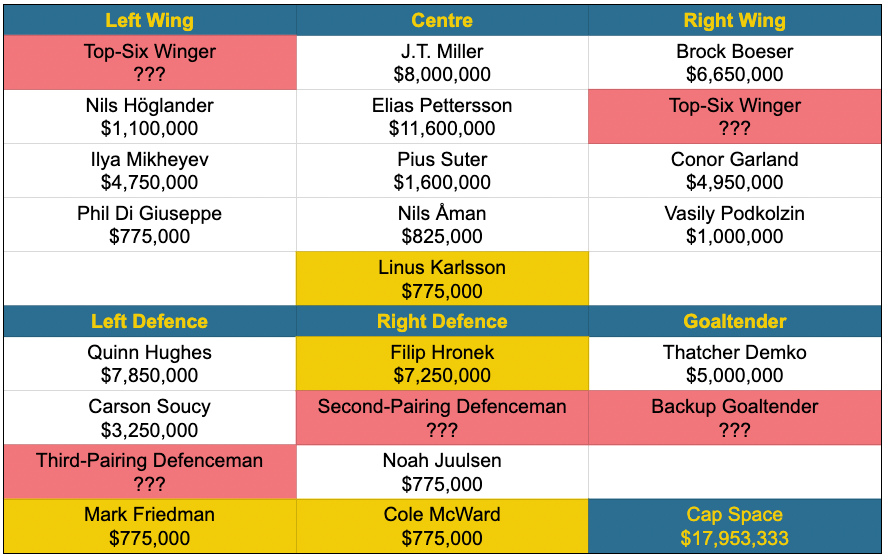The Â鶹´«Ã½Ó³»Canucks signed two of their pending free agents on Thursday but not the two Canucks fans want them to sign.
Fans are holding out hope that the Canucks will be able to bring back Nikita Zadorov and Dakota Joshua but the team’s limited cap space , especially if the Canucks want to swing for the fences in free agency. Unless the Canucks can clear some cap space, they’ll have a tough time re-signing either Zadorov or Joshua, let alone both.
But while those signings will have to wait, if they happen at all, the Canucks have other free agents to re-sign. General manager Patrik Allvin knocked two players off that list on Thursday, re-signing both Cole McWard and Linus Karlsson to one-year deals.
What’s intriguing about both contracts is that they are for less than they would have gotten with their qualifying offer.
Both McWard and Karlsson signed for league minimum
A qualifying offer is a one-year contract offer to a restricted free agent that allows a team to retain that player’s rights even if the player rejects the offer. The qualifying offer is based on the base salary of their previous contract — either the same amount or a small increase based on a formula in the CBA. The deadline for qualifying offers is June 30.
McWard was due to receive a qualifying offer of $840,000, while Karlsson’s qualifying offer was going to be $874,125. Both players could have simply accepted those qualifying offers when they came. Instead, they signed cheaper deals well ahead of the qualifying offer deadline.
Both McWard and Karlsson reportedly signed two-way, one-year contracts at the NHL league minimum average annual value of $775,000.
That’s $65,000 less than McWard’s qualifying offer and nearly $100,000 less than Karlsson’s. But there are several very good reasons why McWard and Karlsson would take a pay cut with their one-year deals.
First of all, it may not actually be a pay cut in the grand scheme of things.
Both players signed two-way deals, which means they get paid less in the AHL than they do in the NHL. Their qualifying offers would also have been two-way deals and the only requirement for the minor-league salary in a qualifying offer is that it can’t be less than their previous minor-league salary.
That would mean an $82,500 salary in the AHL for McWard and a $70,000 salary in the AHL for Karlsson. Negotiating a contract ahead of the qualifying offer means that McWard and Karlsson could negotiate a higher salary in the AHL, even if they get paid a little less in the NHL.
While the full details of Karlsson’s contract haven’t been released, McWard reportedly did get a raise on his AHL salary to $100,000. Karlsson likely received a similar raise. That means, when they’re in the AHL, McWard and Karlsson will make a little bit more than they would have if they just accepted their qualifying offers.
More importantly, by signing for the NHL minimum, they make it more likely that they’ll spend more time in the NHL.
Could McWard and Karlsson make the Canucks out of camp?
Karlsson is now tied with Phil Di Giuseppe as the cheapest forward in the Canucks’ system. McWard joins Mark Friedman, Noah Juulsen, Guillaume Brisebois, and Christian Wolanin as the cheapest defencemen in the Canucks’ system.
With the Canucks looking to use every inch of their cap space to improve the team, they need to have cheap options at the bottom of their roster to make it all work. McWard and Karlsson have now made themselves easier to fit on the roster.
That allows McWard and Karlsson to come into training camp with one impediment removed. If they earn a spot on the roster out of camp with their performance, nothing about their contract will stand in the way, as they’re as cheap as they possibly could be.
That may not make a huge difference for McWard at camp, as he’ll have plenty of league-minimum competition, but it could make a difference for Karlsson as he aims to make the fourth line or be the team’s 13th forward. He’s $50,000 cheaper than Nils Åman and $95,000 cheaper than Max Sasson. That may not seem like much with an $88,000,000 salary cap but even a marginal gain in cap space can be important, such as with the Canucks’ cap-perfect roster at the beginning of the 2022-23 season.
Both McWard and Karlsson have a legitimate shot of making the Canucks. McWard was steady and reliable in his rookie season in the AHL and, with a full offseason to add strength, could be a candidate to play on the third pairing. Heck, he got a long look with Quinn Hughes at last year’s training camp — he might have a better shot to make the team than anyone expects.
Meanwhile, Karlsson was a frequent call-up last season, which made sense with his 60 points in 60 games in Abbotsford. While Karlsson only got into four games from all of those call-ups during the regular season, he also appeared in two playoff games, spending time in the top-six with Elias Pettersson. He’s clearly a player the Canucks believe in.
The Canucks' salary cap situation after signing McWard and Karlsson
Even if they don’t make the Canucks out of camp, being on a league-minimum contract makes it a lot easier for McWard or Karlsson to get called up during the season. And every day spent on the NHL roster means getting paid an NHL salary. In the end, McWard and Karlsson could make quite a bit more on a league-minimum deal than they would have with their higher-salary qualifying offers.
Let’s imagine for the moment that both McWard and Karlsson make the Canucks’ roster out of camp. What would that look like for the Canucks’ salary cap picture?

Penciling in McWard and Karlsson leaves the Canucks with just short of $18 million in cap space with five roster spots still to fill.
Even going as cheap as possible with the team’s depth, there’s no chance that the Canucks can re-sign Zadorov and Joshua while still leaving enough space to pursue Jake Guentzel in free agency. They’ll either have to find a way to trade Ilya Mikheyev or look for cheaper options to replace those two players.
If the Canucks can find a way to clear Mikheyev’s cap space off the books, however, McWard and Karlsson’s cheap contracts could play a role in the Canucks fitting some bigger names under the cap.



